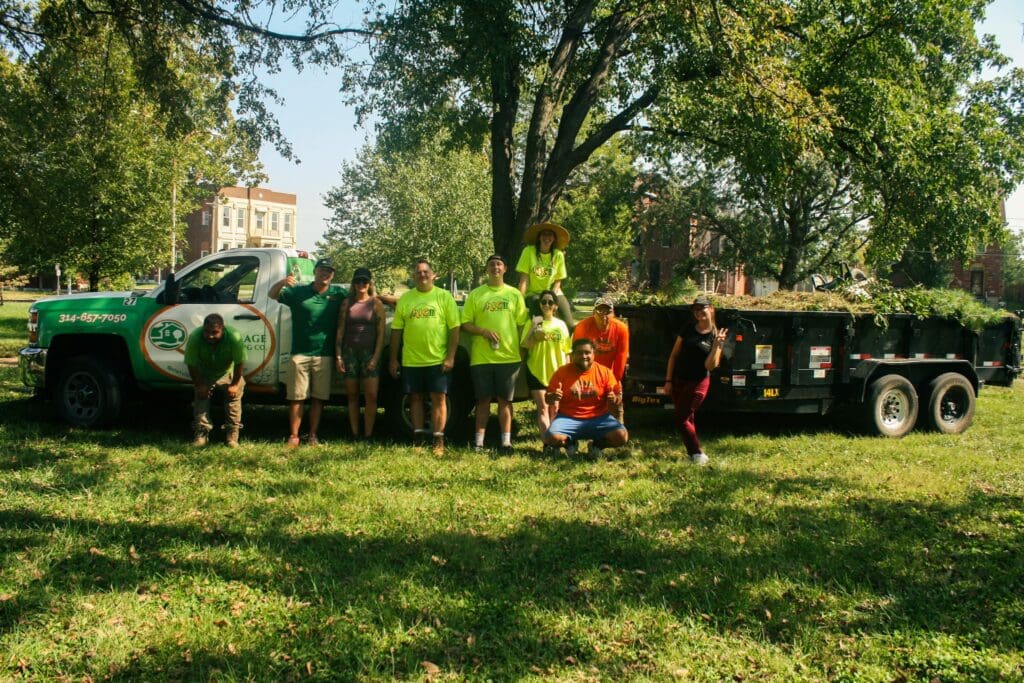
If given the choice, would you rather your crew leader handle filing your taxes as part of their job or have a CPA do that? Similarly, asking different team members to put on a recruiting hat on top of their other responsibilities isn’t going to get you the best results. Sure, they might be able to get the job done, but choosing to hire someone whose full-time position is recruiting provides a level of focus that can be crucial to boosting your landscape company’s growth.
“Since onboarding our recruiter, MSNW has seen a marked improvement in our hiring process,” says Joe Bushey, human resources director for MSNW Group, LLC, based in Ferndale, Washington. “Candidate selection efficiency and quality have significantly been enhanced, leading to a more streamlined and effective hiring process.”
Dennis Evans, owner of Quiet Village Landscaping, based in St. Louis, Missouri, says that their hiring efforts have improved a thousandfold since bringing on their recruiter.
“A really big time saver that has helped internally is that our managers can focus on their roles and responsibilities, whether it’s running crews, selling jobs, and training employees,” Evans says. “They can focus on that instead of sitting through interviews to sift through 10 candidates.”
David Koehn, president of Koehn Outdoor, based in Jacksonville, Florida, says they’ve had a larger number of candidates coming in compared to years past since they added their recruiter role.
Stephanie Corrigan, human resources manager for Mountain View Landscapes, Inc., based in Chicopee, Massachusetts, says not only have their recruiting efforts improved, but they’ve also been able to improve and streamline their onboarding process since hiring their recruiter.
“She’s more than doubled the number of people hired compared to previous years,” Corrigan says. “It is satisfying to say we achieved full staffing capacity!”
When to Add a Full-Time Recruiter
A major question lawn and landscape companies can have is when is it necessary to hire a full-time recruiter. There is no one answer to this question, as every company is growing at a different rate and has different needs.
Bushey says that MSNW has had their full-time recruiter for the past eight years, while Koehn Outdoors just added a recruiter 18 months ago. Koehn says after operating 10 people below their desired headcount for a year, their consultants encouraged them to consider bringing on a full-time recruiter.

“We grew to a point where we were so busy in the day-to-day operation that you can overlook the human element and you think you don’t really need a dedicated person just to focus on personnel,” Koehn says. “You’re leaning on all of the field training guys and all of the operations team, but bringing in someone who truly understands human development and HR can be that voice for the company for them to come to.”
For Mountain View Landscapes and Quiet Village Landscaping, in a stroke of good timing, they both hired their recruiter in the spring of 2020.
“Given a tight labor market and the competition for talented people, we felt like it was time to really have someone fully dedicated to the task of interviewing more people, casting a wider net and tapping into areas that we didn’t have time to tap into to look for that talent that we wanted to add to grow our business,” Evans says.
Evans notes that previously, getting new hires in the door was a hodgepodge effort between two or three people.
Corrigan says they were growing three locations in two states with multiple divisions, so it was becoming too much for one person to handle HR, compliance, benefits, payroll and recruiting. She says having a dedicated recruiter allowed her to navigate the regulations imposed by the pandemic along with other HR matters while their recruiter worked on hiring in an exceptionally challenging market.
As for at what company size owners should start considering adding a recruiter, Evans says this will vary based on whether you’re in a growth mode or trying to sustain your current size. He recommends businesses at $1.5 million consider getting a fractional recruiter and companies in the $3 to $5 million range consider hiring a full-time recruiter.
A part-time recruiter can help if you can’t afford the overhead of a full-time recruiter. Yet the hardest challenge with this type of recruiter is getting them to understand and evaluate candidates from a cultural standpoint.
Evans says looking back, he wishes he hired a recruiter at least a year before they did, if not two or three years prior.
“At a certain point, it’s really important to have that full-time recruiter because it changes the whole dynamic and focus of the team if they have to step into a recruiting role and then switch back to what their normal position is,” Evans says.
Koehn says they added their recruiter at $8 million but advises companies in the $5 to $6 million range to start looking at filling this position.
“Essentially, you’re going to slow down your growth,” Koehn says. “You’re going to slow down your profitability.”
Finding a Recruiter
Ironically, before you can transition the task of recruiting to another person, you still have to seek out an individual for that on your own.
Evans says they were lucky as their recruiter, Hannah Thorne, was a referral from an existing employee. They had not even posted the position online yet.

Bushey says he found their recruiter through his professional network as well.
“Her exceptional skills as a recruiter and leader, which I witnessed firsthand during our time in the U.S. Army Recruiting Command, made her an ideal candidate for the role,” Bushey says.
Kohen says their recruiter was actually an employee they transitioned from maintenance to the role as he is bilingual and very approachable.
“He knew the industry and knew what we needed,” Koehn says. “I really didn’t even know how to go about bringing somebody in from a recruiting background.”
Corrigan says they listed the opening on Indeed in January 2020 and received about 125 applications.
“Following this, I conducted phone interviews with those who had experience in recruiting, human resources, and even marketing backgrounds,” Corrigan says. “I was looking for individuals with the potential for growth, as I was open to providing training for the right candidate if they did not have tons of knowledge in recruiting. It was very important to me to find a cultural fit for our office.”
Evans advises finding someone outside of the industry to fill your recruiter position.
“It’s a fresh perspective,” Evans says. “They might bring past experiences from other industries that use different methods, different technology, and different evaluation measures on what to bring in the door. Not that the green industry isn’t sophisticated, but I felt like her background from a larger corporate setting would overlap with what we’re trying to do and leveling up our professionalism.”
Bushey adds you should look for someone with organizational skills, attention to detail, and a strong follow-up ethic.
“Finding someone who aligns with your company’s ethos and values is essential, ensuring every candidate is respectfully engaged throughout the hiring process,” Bushey says. “A recruiter should be more than a role filler; they should be an ambassador for your company’s culture and values.”
Setting Them Up for Success
Bushey says the keys to a recruiter’s success are clear expectations, a thorough understanding of the company’s operations, and open communication with all hiring managers.
Part of the clear expectations include set quotas or KPIs for your recruiter to meet. At MSNW, their recruiter’s objective is to maintain open hours below 500, which is tailored to their landscaping and janitorial business model.
“Rather than focusing on individual position quotas, this all-inclusive approach aligns more closely with our operational needs,” Bushey says. “It has helped us maintain a turnover rate well below the industry average.”
At Koehn Outdoors, the goal for their recruiter is to find at least 20 prospects a week. Evans says he and the leadership team will determine how many employees they need at the beginning of the year and when they need them by.
“As a leadership team, we’re constantly reviewing what are the empty spots and when do we want to fill them by, so that’s her KPIs,” Evans says.
Evans also recommends if you hire a recruiter, take the time to convey what your culture is and why it’s that way. Be willing and able to change if they have any recommendations on a direction your culture could go in to improve recruitment and retention. You need to have a company that people want to work for.
“Make sure that you’re showing the team having fun,” Koehn says. “The culture is what’s going to bring in the right people. You want them to want to come here. They always show up with a lot better attitude than us begging someone to come to work.”
Laura Castano, director of human resources for Koehn Outdoor, adds that a company cell phone and reimbursement for gas also allow their recruiter to do whatever is necessary to reach people.
“I think setting them up for success is a combination of support, resources, and open and clear communication,” Corrigan says. “For Lisa, she didn’t come from the landscaping industry, so she was also learning the means and methods of fieldwork to be able to effectively screen landscape candidates. We gave her the training and tools and then adapted them to what worked in a challenging market, which is something we are continuously looking at and adjusting if needed based upon the conditions.”
Defining the Role
One thing you have to decide with your recruiter position is how involved you want them to be with the onboarding and retention aspects.
Failing to do so can muddy the waters and create distractions for your recruiter. Koehn says they have had their recruiter receive calls from employees requesting help getting a raise.
“The recruiter needs to stay focused on recruiting and not get too involved in the HR function,” Koehn says. “In other organizations, they may have dual roles, but for us, we truly want our recruiter focused on recruiting.”
If this is how you want the role structured, you need to have a clear process when onboarding so employees know who their point of contact is going forward for HR-related concerns.
At Mountain View Landscapes, their recruiter oversees everything from start to finish, placing the advertisements, screening applicants and guiding new hires through the onboarding phases.
“This includes in-depth explanations of the process, our company and benefits, and the completion of all necessary paperwork in our HR portal,” Corrigan says. “Once everything is completed, she sets up the first day between the employee and manager.”
Bushey says that their recruiter also posts job openings and screens the candidates, which allows their hiring managers to select the most qualified candidates.
Evans says their recruiter conducts initial interviews to narrow the list down to the top three applicants. He says she has not only done a great job grasping their culture but has also influenced it.
“Part of her role and responsibilities are recruiting, but also there’s a whole HR component and retention component involved with her day-to-day activities,” Evans says.

Thorne is responsible for Quiet Village’s culture-building activities. She throws monthly barbecues and ensures their managers are doing quarterly employee reviews. He says the employee reviews were something that fell by the wayside in the past but now that their recruiter is tracking this, they are done consistently, which helps with employee retention.
“We’re constantly touching with those employees, making sure that they’re happy, making sure that satisfied with their job,” Evans says. “If they’re not, we’ll know before we used to because she’s on top of it, as opposed to waiting six months down the road and the employee is unhappy and they decide to jump ship. You don’t know why until it’s too late and they’ve already agreed to moving careers or changing companies.”
Thorne tracks all of this in their HR software, which also features applicant tracking software. Evans says the ATS allows Thorne to build a database for jobs in the future, so if they’re looking for another sales rep, they can go back through candidates who applied in the past.
“As a recruiter, you would think that her main focus is getting new employees in the door, but at the same time by her bringing in these employees, it’s created a safe space for them to go to when maybe they’re not really feeling so awesome about their job,” Evans says. “She’s a safe haven to go to voice any concerns, recommend any adjustments on the workspace or whatever it might be to make sure that they’re happy.”
Advice for Others
Koehn says it’s easy to overlook the importance of personal and professional development in your organization. However, hanging core values on the wall doesn’t mean anything if you don’t have the right people on the bus.
“Having poor recruiting and a poor pipeline allows for lower grades of behavior with your current employees,” Koehn says. “If you don’t have anybody to replace them if they’re five minutes late, you’re just going to swipe it off and go ‘Try harder next time,’ because you’re not going to want to write them up and discipline that particular employee because you have no one to fill that shoe.”
Evans adds that a proper recruiter will be able to help with retention as well so that you don’t need recruitment as severely.
“The ironic thing is that if you do hire a full-time recruiter, you actually will be recruiting way less because the recruiter has brought on board awesome people,” Evans says. “Their job probably will shift into more of a cultural piece, HR piece and training piece more so than the actual recruiting activities.”
Corrigan encourages hiring a recruiter as they will only contribute to the overall success and growth of your business.
“Investing in a full-time recruiter will only enhance your company’s ability to attract, hire, and retain top talent,” Corrigan says. “Your existing staff performing recruitment duties will gain valuable time to concentrate on their respective areas, resulting in improved performance and efficiency within their sections.”
This article was published in the May/June issue of the magazine. To read more stories from The Edge magazine, click here to subscribe to the digital edition.




